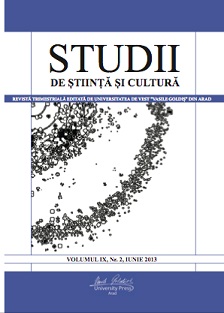Phantasia, o cale de mediere între percepţie (aisthesis) şi gândire (noesis)
Phantasia, a Mediation between Perception (Aesthesis) and Thought (Noesis)
Author(s): Gabriela VasilescuSubject(s): Literary Texts
Published by: Editura Universităţii Vasile Goldiş
Keywords: Phantasia; illusion; imagination; chimera; vision; culture; Phantasia; illusion; imagination; chimère; vision; culture; Phantasia; iluzie; imaginaţie; himeră; viziune; cultură.
Summary/Abstract: The present paper aims at analyzing the creative force of phantasia, as it reveals itself in various works of art. The concept of phantasia defines the affectivity stirred in the mind of the spectator immediately after ceasing the physical contact with the image, sound, form or colour. This psychological state is opposed in meaning to the apatheia, as pathe (the affectivity) is associated with the affects, which are, in their turn, bound to the bodily perception and senses. Pathe gives dynamism to the phantasia triggered at the end of the sensorial contact and it stimulates the illusions. Only the human being, in its ephemeral passage through existence, can experience the state of phantasia. This specific state is the mingle of perception and judgement which leads to a certain “impression” that we can relate to the illusion, appearance or the fiction we delude ourselves with but which, at the same time, constructs our identity in the realm of culture. The two ontological levels – dream and reality – will never be conciliated; on the contrary, they will eternally keep on alternating in the illusion of fiction. Through this illusion we give life to imaginary things and events and this strive draws together both perception (aisthesis) and thought (noesis). When perception fades away, representation sheds its light on forms, contents, colours, sounds, words, all these being the fittest tools for the artistic expression. Yet each chimeric frame we bear inside is nothing but our cultural identity, “the measure” (as Protagoras said) of our phantasia or, consequently, of the illusion we lived in and we imagined in and by culture.
Journal: Studii de Ştiinţă şi Cultură
- Issue Year: IX/2013
- Issue No: 02
- Page Range: 89-97
- Page Count: 9
- Language: English

